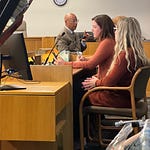Hey folks, I’m trying out Substack’s audio feature this week. (It’s a trial feature here on Medical Motherhood — I only had time for one take so it’s far from perfect!) Please let me know if you find it useful.
“If serious people never wrote deeply about the household, about work and gender and money and race, we couldn’t expect things to improve. If the centrality of these domestic chores was consistently denied, then women would just keep doing all the work.” — Megan K Stack
We don’t value the work that women do.
Quite literally, the American economy does not assign very much money to the jobs that, traditionally, females have performed.
Generations of unpaid or underpaid teachers and health care workers and childcare providers have subsidized caring for the young and fragile.
These workers, even when not women, were willing to do it because they knew it was good for the community, because they felt called by their Creator to do it and, frankly, because they weren’t allowed to do much else.
Even today, whenever I see something truly helpful to my family from the medical, educational or social services sectors it is almost always because a woman is stepping up — working extra hours, or above her pay grade, or bending the rules — to make it happen.
In our post-COVID world, that seems to be changing. Health care workers are striking. School staffers are leaving in droves. The women who have a choice are choosing to take higher-paying jobs — those traditionally occupied by men. The ones who don’t have a choice — or who are burned out juggling it all — are throwing in the towel.
According to the National Women’s Law Center, 2.3 million women left the workforce since the pandemic started. That has resulted in the lowest percentage of women in the labor market since 1988.
It’s no wonder so many are making the decision to quit. In 2019, women still earned 82 cents on the dollar compared to men, according to the Bureau of Labor Statistics. Childcare is frighteningly expensive and public schools are open fewer than half the days in a year.
In an incisive memoir called Women’s Work* by journalist Megan K Stack, she explored this phenomenon in her own household. As a new mother, she was unable to work without the support of low-wage women of color, who themselves were relying on unpaid female relatives or others to care for their own children.
“There is a lingering expectation that men will pay in money. But when it comes to time, it is almost always the woman who pays,” Stack wrote. “…Never mind that, writ large, all these minor chores are the reason we remain stuck in this depressing hole of pointless conversations and stifled accomplishment. Never mind that we are still, after all these waves of feminism and intramural arguments among the various strains of womanhood, treated like a natural resource that can be guiltlessly plundered. Never mind that the kids are watching. If you mind, you might go crazy.”
*
For the women who happened to become mothers of disabled children, this sexist phenomenon is particularly acute.
Though there is a growing movement in America to pay parents to raise children, such as with the new Child Tax Credit payments, many medical mothers are trapped without viable alternatives to doing it themselves.
To most people, it’s clear that caregiving and parenting are not the same. That is why society agrees to pay for caregivers. But Medicaid still expects disabled children to have so-called “natural supports” and, in most states, does not allow biological parents to be paid caregivers to their minor disabled children.
Grandparents can be paid, step-parents can be paid, older brothers and sisters can be paid. For older disabled folks: spouses can be paid, adult children can be paid. In fact, pretty much everyone is allowed to be a paid caregiver in Medicaid’s Home & Community Based Services, except criminals and young mothers.
If we as a society want our elderly, people with disabilities, and the next generation of children to live in safe, secure households with the resources they need to thrive, I can only imagine two solutions. Either we socialize care tasks — everyone gets free laundry services, grocery delivery, meal prep, childcare — as was imagined decades ago but never widely implemented. Or, we pay people a decent wage to perform care tasks, even if they are women and even if they are doing it for their own families.
There is starting to be slow movement in that direction. Congress seems to finally be throwing traditionally female job titles a bone. The Build Back Better plan has $150 billion for caregivers, higher wages for childcare workers and cash for parents. But I’ve asked several federal lawmakers and lobbyists and none say they are interested in changing the rule that in many states prevents parents of young disabled children to be paid caregivers.
The free market has not created a solution to this. It never will. Children have very little market capitalization; disabled children even less.
It’s up to us to demand better from our governments.
Medical Motherhood’s news briefs
• From The Business Standard: “Nearly 240 million children around the world have disabilities: Unicef report”
"From access to education, to being read to at home; children with disabilities are less likely to be included or heard on almost every measure. All too often, children with disabilities are simply being left behind," she added.
• From The Texas Tribune: “Texas schools can again set their own face mask rules after federal judge overrules Gov. Greg Abbott's ban”
A federal judge ruled Wednesday that Gov. Greg Abbott’s executive order prohibiting mask mandates in schools violates the Americans with Disabilities Act— freeing local officials to again create their own rules.
The order comes after a monthslong legal dispute between parents, a disability rights organization and Texas officials over whether the state was violating the 1990 law, known as the ADA, by not allowing school districts to require masks. U.S. District Judge Lee Yeakel barred Attorney General Ken Paxton from enforcing Abbott’s order.
• From The Philadelphia Inquirer via Disability Scoop: “One Boy’s Struggles Show How States Often Fail Kids With Severe Autism”
Dramatic as their experience sounds, it’s not unique. The state Office of Developmental Programs doesn’t track the waiting lists at 33 residential treatment facilities that serve children with intellectual disabilities and autism in Pennsylvania, but people in the provider industry said they are worse than ever. Months-long waits, like the Tolis family’s, are becoming more common.
“We recognize the strain this puts on families,” said Ali Fogarty, a spokesperson for the Pennsylvania Department of Human Services. “We are working to make more services and supports available to help families waiting for a residential placement.”
Medical Motherhood is a weekly newsletter for people raising disabled children, and others who care about disabled kids.
Get it delivered to your inbox each Sunday morning or give a gift subscription. Subscriptions are free, with optional tiers of support. Thank you.
Follow Medical Motherhood on Facebook, Twitter or Instagram.
Visit the Medical Motherhood merchandise store to get a T-shirt or mug proclaiming your status as a “medical mama” or “medical papa.”
Replies to this email go directly to me, Shasta Kearns Moore.
*affiliate link. I may earn a commission from purchases through this link.
















Our systems were built on unpaid and underpaid female work. They are crumbling without it.